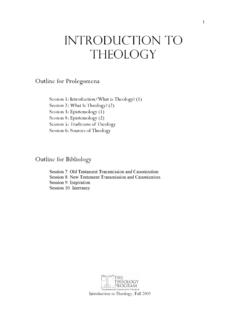Transcription of SECULARIZATION - Emory University
1 SECULARIZATIONS ecularization refers to the historical process in whichreligion loses social and cultural significance. As aresult of SECULARIZATION the role of religion in modernsocieties becomes restricted. In secularized societiesfaith lacks cultural authority, religious organizationshave little social power, and public life proceeds with-out reference to the supernatural. SECULARIZATION cap-tures a long-term societal change, but it has conse-quences for religion itself. In Western countries,where it has been most pronounced, it has made theconnection to their Christian heritage more SECULARIZATION is important beyond the formerlyChristian West, given that many of the forces that firstsustained it there affect other societies as 1648 the termsecularishad been used todenote one side of Christian distinctions between sa-cred and mundane.
2 In the Catholic Church secularpriests were those serving society at large rather thana religious order; SECULARIZATION had referred to thedispensation of priests from their vows. After the 1648 Treaty of Westphalia ended the European wars ofreligion, SECULARIZATION was used to describe the trans-fer of territories held by the church to the control ofpolitical authorities. By the end of the nineteenthcentury, however, it had come to refer to the shiftingplace of religion in society many scholars associatedwith modernization.
3 Used in this way the very notionof SECULARIZATION has provoked contention for morethan a century. Once at the center of conflict betweentraditional advocates of strong public religion andsecularist intellectuals striving to reduce its role, it hasmore recently become the subject of scholarly contro-versy. Although since the 1960s prominent sociolo-gists of religion have charted the course of seculariza-tion, partly guided by the work of MAXWEBER(1864 1920), others have questioned the validity of article first conveys what SECULARIZATION meansand why it happened.
4 It then addresses the reserva-tions of scholars. It shows how critiques have enrichedour understanding of SECULARIZATION without refutingthe best accounts of the process. These continue tocapture convincingly a significant historical transfor-mation in and of society. This transformation stillreverberates across the world stage, not least becausethe value and viability of secular society remains thesubject of global Paris, Sainte-Chapelle, a sanctuary built by a Cath-olic monarch to house Christ s crown of thorns, standsempty, its aesthetic appeal substituting for its oldreligious function.
5 Across the Netherlands churchbuildings no longer needed to serve shrinking congre-gations have been razed or converted into communitycenters. In England majestic cathedrals that manifestin stone and glass the splendor of an old faith nowoften attract more tourists than believers. Where oncea sense of the sacred marked the landscape itself,where social order used to be visibly embedded insacred order, architectural relics attest to a profoundchange: the vanishing of the supernatural from theaffairs of the world, the waning power of religion toshape society at large.
6 In landscapes and architecture, SECULARIZATION has become describes the world the West haslost. In that world faith in the supernatural was per-vasive and important, indeed taken for granted. AChristian version of that faith commanded uniqueauthority, shaping collective understanding of theworld. Its influence extended to art and architecture,music, and literature. Worldviews that denied the va-lidity of Christian doctrine, let alone the existence ofthe supernatural, were taboo. religious elites main-tained clear standards of transcendent belief and ap-plied them to all spheres of cultural activity.
7 In thatworld every community was also a community offaith. To be a member meant identifying with thatfaith. Overt unbelief constituted dangerous deviance,hence cause for exclusion. Community life, its rhythmshaped by religious ceremonies and events, was tingedwith the transcendent. Political authority required re-ligious legitimation; rulers in turn were expected tosustain the cause of religion. In principle, at least, stateand Church had a common mission. Precisely becausereligion mattered greatly in public affairs, it also con-tributed at times to war or civil strife.
8 Organizedreligion commanded major resources, such as valu-able land, buildings, and trained staff. Supported bysuch resources the church long played a key role inproviding education and social services. Its worldlyinfluence reinforced a shared sense of overarchingorder, in which human affairs were subject to higherforces. This world had a tangible connection withGod. It was a society suffused by the also describes the world the Westhas gained. In this world, culture is marked by plural-ism: religious faith takes many forms, and meaninghas many nonreligious sources.
9 The specificallyChristian message is one among others, only one wayto make sense of the world. It is there, available forindividuals to choose, although turned into a prefer-ence, religion has no binding force. Conceptions of thesupernatural, Christian or otherwise, carry little au-thority in science, art, and literature. No church candetermine society s standards of knowledge, beauty,and morality. Even when they make their way intopopular culture, supernatural notions thereby lose any1sacred aura. In this world citizenship requires no re-ligious attachment, and society sets no rules for reli-gious conformity.
10 Secular events shape the rhythm ofpublic life; publicly significant religious occasionstend to lose their transcendent content. Political au-thority derives its legitimacy from legal proceduresand public support. State institutions execute policywith scant consideration of religious purposes. Inmodern media, education, or business, religious insti-tutions exercise greatly diminished influence. Theirresources are dwarfed by those of secular religious strife is less likely to spill over intothe public domain, it diminishes as a cause of domes-tic and international conflict.
